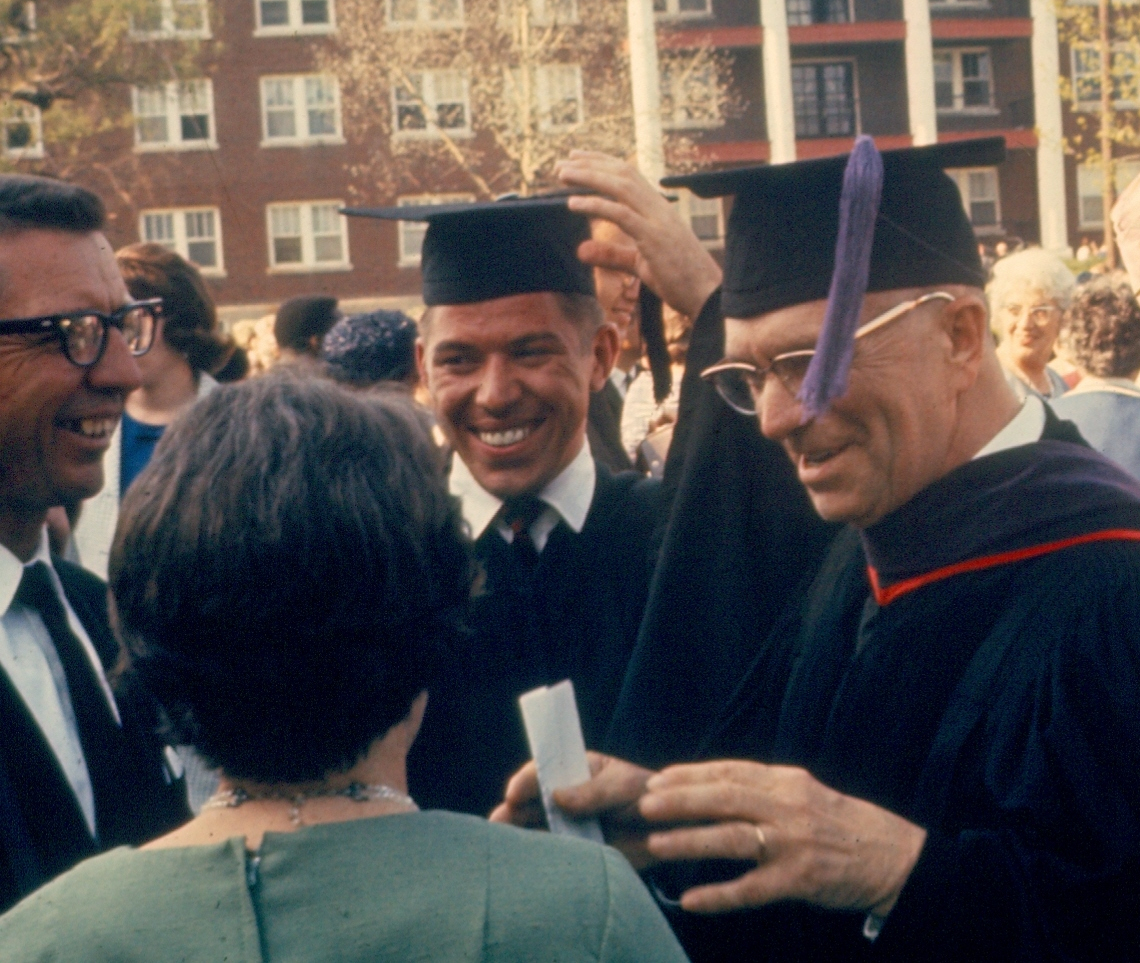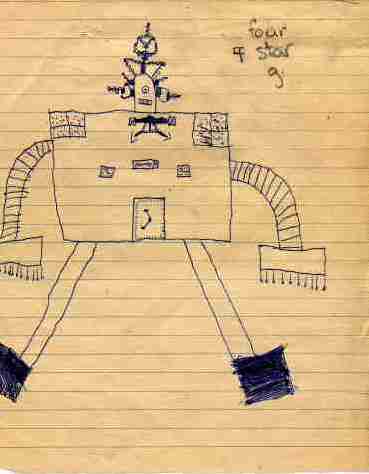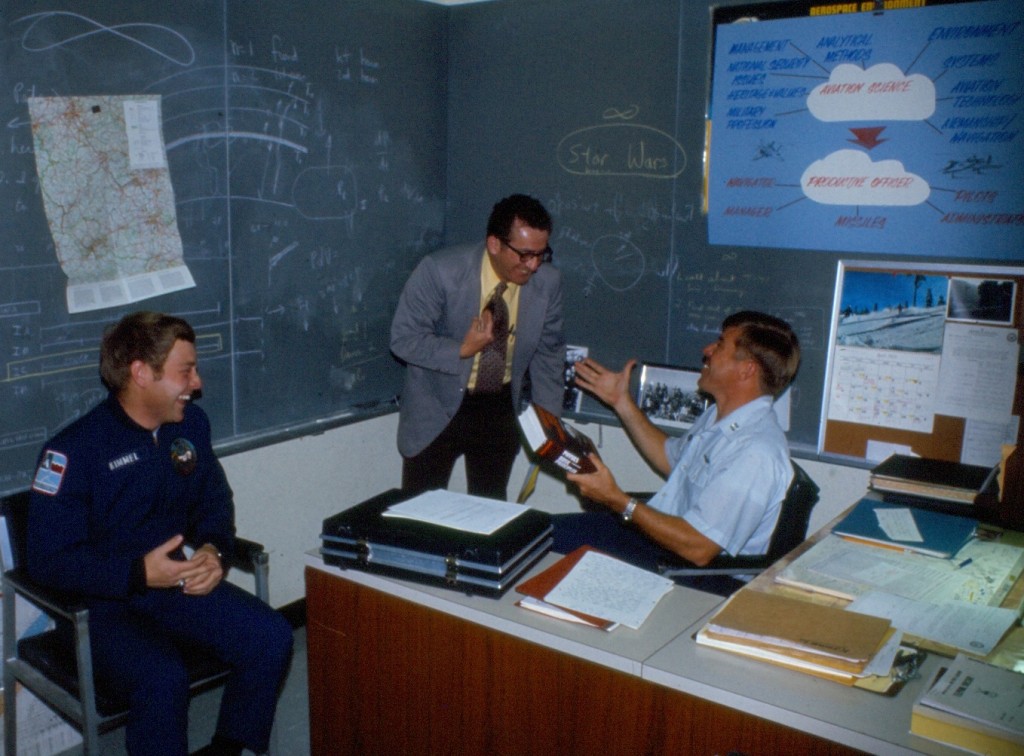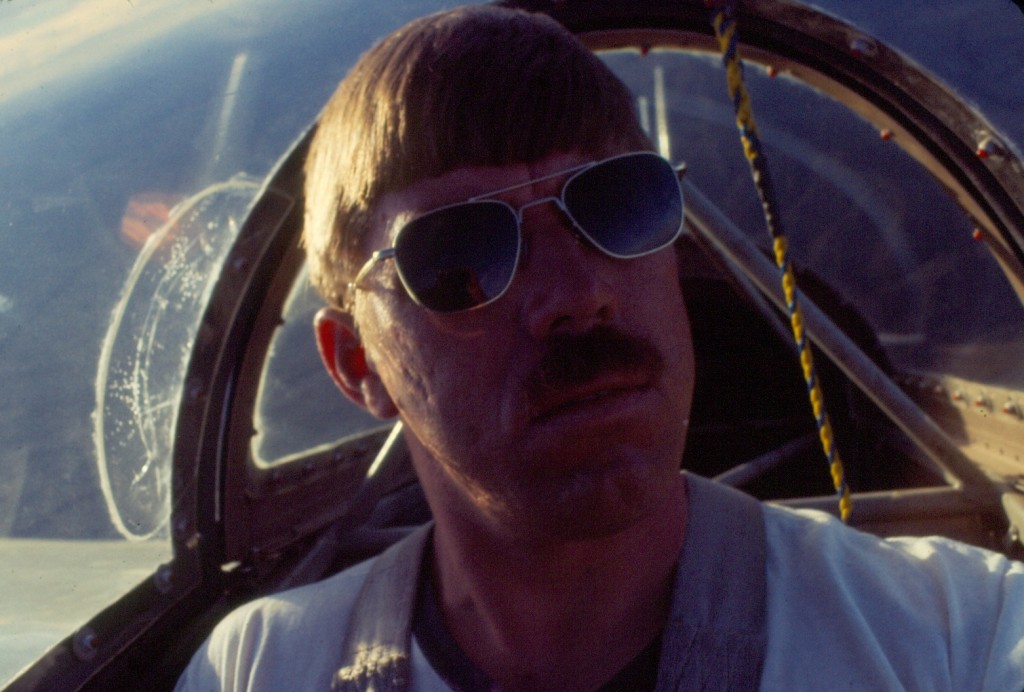This post first ran on August 24, 2011.  My dad and I share an obsession with endurance sports. We don’t just love to get outside and ride our bikes, we actually feel antsy and anxious if we go too many days without working up a sweat. As I’ve written elsewhere, our compulsion for exercise has a genetic basis. Dad and I probably have an exercise inclination gene (or genes) that my mom and sister —who think we’re crazy— don’t.
My dad and I share an obsession with endurance sports. We don’t just love to get outside and ride our bikes, we actually feel antsy and anxious if we go too many days without working up a sweat. As I’ve written elsewhere, our compulsion for exercise has a genetic basis. Dad and I probably have an exercise inclination gene (or genes) that my mom and sister —who think we’re crazy— don’t.
On a recent visit to my parents, I wondered if a passion for science might also have some inherent basis. The thought occurred to me as Dad showed me some old photos. In one of them his parents, Mennonite wheat farmers who never went to college, are standing with Dad at his graduation from Taylor University. How did a farm kid from Kansas who grew up without ever knowing a single scientist end up with a master’s degree in physics, I wondered.
Dad told me he’s been interested in science for as long as he can remember. It’s like he was born with it. His lifelong passion for astronomy wasn’t something he picked up from an older sibling or a teacher or family friend. He developed it on his own, without any outside nurturing. As a kid, he would sometimes stow away in the garage and listen to science fiction programs on the car radio. One year he sold a calf to buy his first telescope. In high school, Dad eagerly anticipated learning about biology, but when the time came his tiny school had no biology teacher and so it was just him and the textbook. He never did take a real biology class. He had no science mentors until he reached college, and by then he’d already chosen to pursue a physics degree.
 My friend George Johnson tells a similar story about his interest in science. As a kid, he was always fascinated by science and wrote his first book, Things in Space, as a student at Monte Vista Elementary School in Albuquerque. George’s father was a physician, so he had more exposure to science at home than my father did, yet George says that his fascination with science began in early childhood without any special nudges from his parents. Though he didn’t major in science at college, George grew up to become a renowned science writer and the author of numerous award-winning science books.
My friend George Johnson tells a similar story about his interest in science. As a kid, he was always fascinated by science and wrote his first book, Things in Space, as a student at Monte Vista Elementary School in Albuquerque. George’s father was a physician, so he had more exposure to science at home than my father did, yet George says that his fascination with science began in early childhood without any special nudges from his parents. Though he didn’t major in science at college, George grew up to become a renowned science writer and the author of numerous award-winning science books.
Unlike Dad and George, I was raised with science. Dad was a fighter pilot when I was growing up, but he also taught physics at the Air Force Academy for three years and never missed an opportunity to explain the physics of everyday phenomena. I remember an incident one summer afternoon when my little sister’s ice cream slid off the cone. Jill had been holding the cone at an angle, and Dad took one look at the scoop of ice cream on the sidewalk and said, “Basic physics, girls. Basic physics.”
 It was a common refrain in our household. Dad’s answer to every “why” question inevitably began with that same explanation—basic physics. I was an eager learner, but I wasn’t one of those kids who dreamed of becoming an astronaut or a scientist. At age ten, I wrote in my diary that I wanted to become a gymnast and a writer. I didn’t aspire to become a scientist until college.
It was a common refrain in our household. Dad’s answer to every “why” question inevitably began with that same explanation—basic physics. I was an eager learner, but I wasn’t one of those kids who dreamed of becoming an astronaut or a scientist. At age ten, I wrote in my diary that I wanted to become a gymnast and a writer. I didn’t aspire to become a scientist until college.
So how did I end up studying biology and pursuing a science-related career? Was it Dad’s nurturing that led me to choose science, or was I inherently drawn? I imagine it was a combination of both. While it’s true that Dad’s constant talk of physics fostered my scientific curiosity (my high school anatomy and physiology teacher, Mr. McDougal, helped me discover the wonders of biology), I can’t help but think that my brain was already somehow primed to think scientifically. I’ve always found myself drawn to empirical explanations for the world around me, and this way of thinking feels more intrinsic than learned.
I began college without a declared major (I was interested in everything and couldn’t decide), but looking back, it seems preordained that I’d choose a science. As an undeclared freshman, I opted to take calculus, physics, general biology and astronomy. By the following year, I’d become a biology major, in part because I liked biology’s emphasis on big ideas rather than equations.
 Perhaps like Dad, I simply gravitated to the type of science that fit most naturally with my other interests. Dad loved airplanes and gazing at the stars. His college didn’t have an astronomy major, so he studied physics, which could explain how planes stayed aloft. I loved running in the mountains, and biology could explain athletic performance and help me understand the alpine ecosystems I loved so dearly.
Perhaps like Dad, I simply gravitated to the type of science that fit most naturally with my other interests. Dad loved airplanes and gazing at the stars. His college didn’t have an astronomy major, so he studied physics, which could explain how planes stayed aloft. I loved running in the mountains, and biology could explain athletic performance and help me understand the alpine ecosystems I loved so dearly.
I have yet to find any hard data to answer my original question—Is there a science inclination gene like there are exercise inclination genes? My own experience is merely anecdotal. Just because it feels like my love of science has an innate component doesn’t mean it actually does.
I would love to see someone study this question. It turns out that there are many families of scientists. The Kornberg family, for instance, has two Nobel laureates in its ranks—father Arthur Kornberg and his son Roger Kornberg. If there’s a Nobel prize gene, the Kornbergs probably have it. But what about my own family? If an interest in science really is inherited, how did my dad acquire it? Can this trait arise independently, or did Dad have scientifically-minded ancestors he doesn’t know about? I will probably never know the answer.
***
Photos: Dad’s graduation from Taylor University.
Illustration from Things in Space, courtesy of George Johnson.
Captain Dee Friesen (my dad), in his Air Force Academy office enjoying a laugh with student Dave Kimmel and Solomon Gartenhaus, author of the textbook in Dad’s hand.
Self-portrait of dad in his glider.
Fascinating article!
As an additional example of the randomness of all this, take my family. I have a BS astrophysics and PhD in geophysics – no one else in my heritage even has a college degree, let alone any interest in science.
I was one of those “That’s physics in action” dads who constantly explained things about the world to my two kids. I went to college while my kids were in school, so they even saw me working out problems on the whiteboard in our dining room (yes, we’re that kind of family). We home-schooled for a while and when my daughter entered public High School, she was ready to take Calculus as a freshman. She earned the highest grade in the class, clearly out-stripping her older peers. My son was always interested in how things work and how things *could* be in the future. We explored all sorts of things together.
With all that science background, they are both now … wait for it … writers! My daughter has a degree in linguistics and works at a literary agency while shopping her first fantasy novel. She runs two blogs. My son has a degree in creative writing and is teaching English in Japan while working on his first sci-fi novel. Go figure.
Neither one was even remotely interested in studying a science field in college. Perhaps I inoculated them? Or maybe they’ve found their passion? And actually, through listening to their dinner table conversations about writing, I discovered that I enjoy writing too. (Though I doubt I’ll ever publish anything – I just do it for fun.)
So, is there a science gene? Hard to say. In my family, at least, where there is no dearth of curiosity among us all, science is not the chosen direction.
Life is complicated but beautiful, isn’t it.